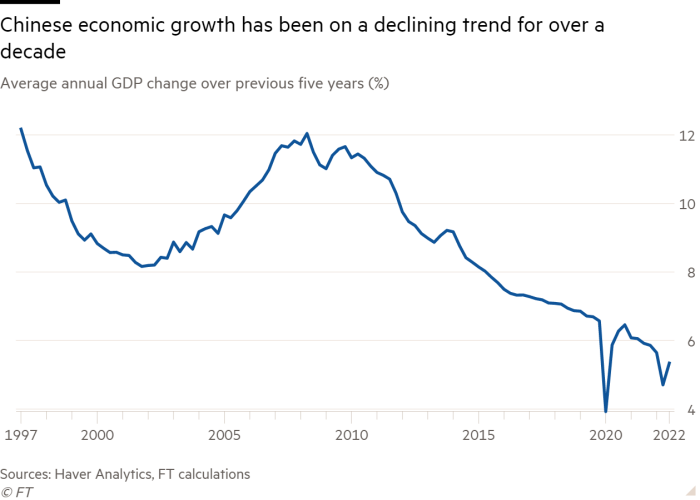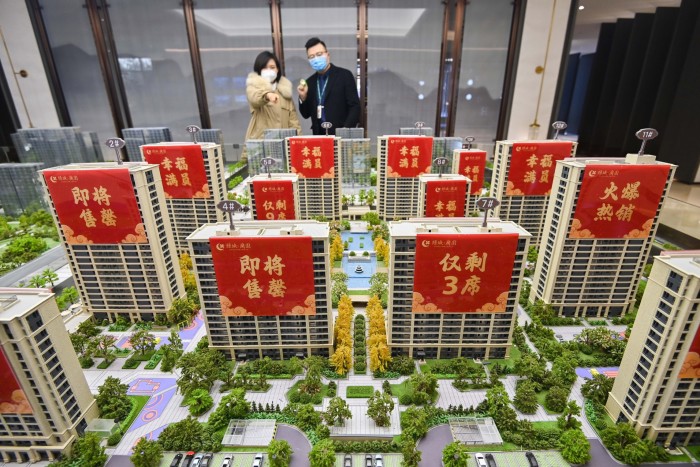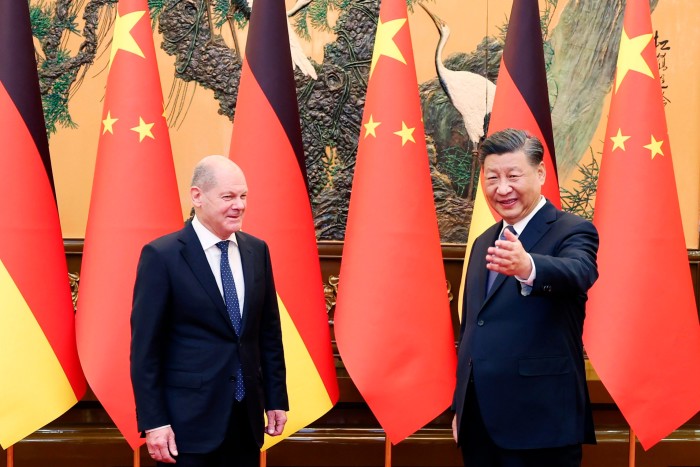The costs of China’s chaotic exit from its zero-Covid strategy are surging. In spite of a virtually static official death toll, a slew of obituaries for elderly public figures from academics to opera singers demonstrate the impact of the virus among its vulnerable population.
Hospitals in several parts of the country are overwhelmed, and a scramble for antiviral drugs and painkillers is creating shortages across Asia. Unofficial projections are putting the number of people that could die in China’s exit wave at about 1mn.
Such prospects not only damage the image of Xi Jinping, China’s most powerful leader since Mao Zedong. They also leave Beijing’s propaganda organs struggling to defend policies after two years spent playing up hefty death tolls in the west as evidence of China’s superior governance.
But behind the havoc, a fundamental reset is taking place in Xi’s foreign and economic policies. According to Chinese officials and government advisers, Beijing is putting together policies aimed at improving diplomatic ties that have soured badly and boosting a deeply strained economy.
The motivation behind the intended resets — the success of which remains uncertain — derives from a confluence of different economic, social and foreign policy stresses that have reached critical levels, the officials and advisers add.

Several of the new policies and plans represent a fleshing out of the “spirit” of the 20th congress of the Chinese Communist party in October, the most important set-piece event in the Chinese political calendar for five years that established the tone for a series of long-range objectives.
After months of fierce internal politics, Xi secured an unprecedented third term as leader of the CCP and was able to pick a ruling politburo composed exclusively of loyalists. With the congress behind him, Xi is now attempting a course-correction.
From an economic perspective, the main goals are to restore robust growth to China’s slowing economy, improve the lot of hundreds of millions of Chinese rural workers, stabilise the ailing property market and shore up a crisis afflicting the finances of scores of local governments, the officials and government advisers say.
Chen Zhiwu, one of several leading economists who expect Beijing to push through a series of pro-growth policies, said he expects 2023’s target will be “6 per cent or higher” — much higher than the IMF’s projection of 4.4 per cent.
“Given that they may aim for an average growth rate of 5 per cent and 2022 is likely to deliver about 3 per cent, they need to have something like 7 per cent for 2023,” says Chen, a professor of finance at Hong Kong University. Several other economists have predicted 2023 GDP growth at above 5 per cent.
From a diplomatic perspective, China’s main aim is to improve relations with some countries in the west, after a period which has at times left Beijing feeling uncomfortably isolated. The focus is on ties with Europe, which have been badly damaged by China’s support for its partner Russia throughout Moscow’s war against Ukraine.

“Diplomatically, Beijing hopes it will not become a rival to every country in the west and nor does it wish to look isolated at multilateral fora,” says Yu Jie, a China expert at UK think-tank Chatham House. “Russia’s faltering military adventure in Ukraine has significantly reduced Beijing’s return on investment in its bilateral ties with Moscow.”
While Xi and Vladimir Putin, Russia’s president, pledged last month to deepen bilateral ties, several Chinese officials in private conversations with the Financial Times strove to put clear daylight between Beijing and Moscow on the issue of Ukraine — a message that has been repeated to some European diplomats.
Some are scathing. “Putin is crazy,” says one Chinese official, who declined to be identified. “The invasion decision was made by a very small group of people. China shouldn’t simply follow Russia.”
Mistrust with Moscow
The starting point for Xi’s diplomatic reset is a re-evaluation in Beijing about the benefits of its close relationship with Moscow.
China now perceives a likelihood that Russia will fail to prevail against Ukraine and emerge from the conflict a “minor power”, much diminished economically and diplomatically on the world stage, according to Chinese officials.
In addition, for all the public professions of bilateral amity, in private some Chinese officials express at least a measure of mistrust towards Putin himself.
Five senior Chinese officials with knowledge of the issue have told the FT at different times over the past nine months that Moscow did not inform Beijing of its intention to launch a full invasion of Ukraine before Putin ordered the attack.
Such views are at odds with the impression given by a joint statement issued by China and Russia on February 4 following a meeting between Xi and Putin in Beijing — just 20 days before Russia attacked Ukraine. It proclaimed that there were “no limits to Sino-Russian co-operation . . . no forbidden zones”.

No transcript of their conversation has been made public, so exactly what passed between Xi and Putin is unclear. However, one official told the FT that the closest that Putin got to informing Xi was to say that Russia “would not rule out taking whatever measures possible if eastern Ukrainian separatists attack Russian territory and cause humanitarian disasters”.
This line was taken by the Chinese side as signalling the potential for some limited military engagement, not the wholesale invasion that Putin launched, the official said.
Evidence to support failures of Chinese understanding, according to Chinese officials, has been the demotion in June of Le Yucheng, who at the time of the invasion was a vice-minister of foreign affairs and the ministry’s top Russia expert. Le had been widely spoken of in Chinese official circles as the likely next foreign minister. He now occupies a post as deputy head of the National Radio and Television Administration.
“Le was demoted by two levels of seniority,” said one person familiar with the issue. “He was held responsible for the intelligence failure on Russia’s invasion.”
Whatever the exact nature of what Putin told Xi, Chinese diplomats seeking to rehabilitate China’s standing in Europe have in private conversations maintained that Beijing was unaware of Moscow’s intention to launch a full invasion, Chinese officials and European diplomats said.
This line is just one strand in a broader strategy aimed at lessening China’s sense of isolation and preventing Europe from becoming even closer to the US.
Beijing’s main ploy is to attempt to reassure European counterparts that it is willing to use the closeness of its relationship with Moscow to restrain Putin from resorting to the use of nuclear weapons, Chinese and European officials say.

Another aspect of Beijing’s strategy is to position itself not only as a potential peacemaker but also as a willing party in any postwar efforts to help rebuild Ukraine, Chinese officials say.
Xi himself sought to portray himself as on the side of peace in remarks he made to Putin late last month.
“The road to peace talks will not be smooth, but as long as the efforts are not given up, the prospect of peace will always exist,” Xi said. “China will continue to uphold an objective and fair stance, work to bring together the international community, and play a constructive role in peacefully resolving the Ukrainian crisis.”
In another sign that China is seeking to dial back its antagonism towards the west, it has sidelined Zhao Lijian, one of its most prominent “wolf warrior” diplomats. A former official spokesperson for the foreign ministry, Zhao is now listed as one of three deputy directors for boundary and ocean affairs, a relatively obscure department.
Zhao, who has 1.9m followers on Twitter, frequently used his account to lash out at the west. In 2019, Susan Rice, who served as Barack Obama’s national security adviser, labelled Zhao a “racist disgrace” after he sent a provocative tweet about race relations in Washington DC.
As it seeks to repair ties with European powers, Beijing is insisting that its European counterparts agree to repeat a “no decoupling” mantra — marking a clear difference with Washington, which is seeking to limit US commercial ties with China in certain areas, particularly with regard to sensitive technologies.
“China has realised that it has antagonised too many countries at the same time, particularly among developed countries which still today are its main trade and economic partners,” says Jean-Pierre Cabestan, a China expert at Hong Kong Baptist University.

“So it is trying very hard to reach out to the EU and key European nations — Germany, France, Italy and Spain — as well as America’s Asian allies, such as Japan and South Korea and US partners such as Vietnam.”
The EU is China’s biggest trade partner and Beijing runs a huge trade surplus with the bloc. Similarly, several of Europe’s leading companies rank among China’s biggest foreign investors.
China’s desire for a diplomatic reset…
Read More: Xi Jinping’s plan to reset China’s economy and win back friends



































